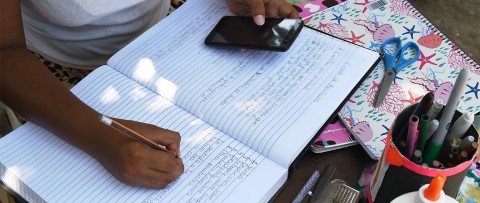- Thought Leadership

Sponsored children receive education and tutoring support through digital platforms like WhatsApp.
When joining Children International, young people gain access to the education they need to succeed, based on age, location and their own unique life circumstances. Keeping children from falling behind early is critical to their academic success. Tutoring programs help students receive the extra attention and assistance that so many of our disadvantaged children need to stay on track and complete their education.
Led by teachers or older volunteer students who know the children personally and care about them, children learn from tutors who have a proven track record of success. Continuing to provide educational tools like tutoring becomes difficult, but no less important, during crises like the one the world is in now. Thanks to our supporters, staff, educators, parents and children have found ways to adapt with schools and community centers shuttered.

In Quito, Ecuador, staff created promotional materials for digital tutoring courses for sponsored children and youth. Tutoring is one of the many programs that quickly shifted to a digital model during stay‑at‑home orders.
Distance-learning has become a priority since the pandemic hit. In India, staff are using WhatsApp for continued learning. Teachers and tutors remotely help students complete their assignments and are giving parents recorded messages with information about how to assist their children during home-schooling. Staff will soon test the use of Zoom, a videoconferencing technology, with the goal of further improving students’ lives.
In the Dominican Republic, staff continue tutoring through virtual classes and, each week, conduct evaluations to measure the program’s effectiveness. The results have been encouraging. They report an increase of 90% in learning, measured through quizzes.

Virtual classrooms, like this one in the Dominican Republic, provide the assitance children need to stay ontrack with their education.
Our supporters have helped us find other inventive ways of reaching students who have difficulty accessing technology. In Colombia, staff prepare short educational activities to share with families who then engage their children in learning. Donated books are being sent to children who do not have internet access or computers.
Across the globe, we are learning to navigate successfully through this unprecedented crisis, continuing to teach our children so they can continue making educational progress wherever they are.
Comments
You must be logged in to comment. If you have an account, click here to log in.